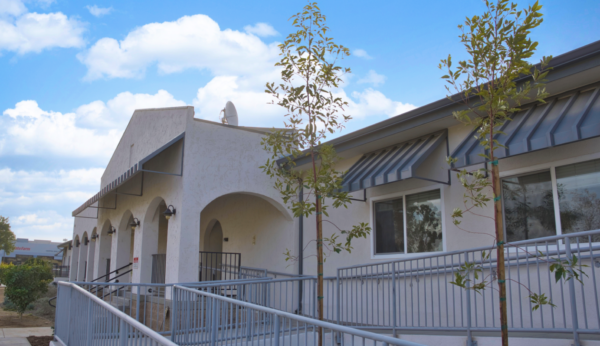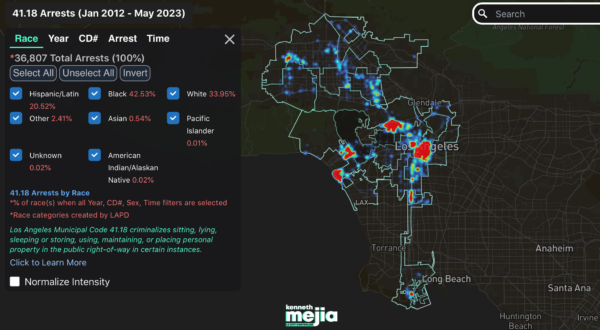A federal judge Thursday gave final approval to a settlement of a lawsuit between Los Angeles County and the American Civil Liberties Union over longstanding problems at the Twin Towers Correctional Facility in downtown Los Angeles.
The agreement includes a requirement that the county will create at least 1,925 new community beds as alternatives to jailing people with mental illness. Close to 1,700 of those new placements will be online within the next two years, according to the settlement.
LA County also agreed to increase mental health staffing in the Inmate Reception Center. These staffers will screen and prescribe medication for people while they are still in the IRC going through the intake process or within 24 hours of being moved out of the book center.
As part of the county’s efforts, Sheriff Robert Luna has created a new supervisory position in the IRC filled by a sergeant on each of the three daily shifts to monitor compliance with the requirements set forth in the settlement 24/7, court papers show.
“This is a watershed moment for the ACLU’s jail and prison decarceration movement,” Corene Kendrick, deputy director of the ACLU National Prison Project, said in a statement.
“This is the first time in the country a jurisdiction that we or other advocates have sued agreed that the cornerstone to addressing abysmal jail conditions and overcrowding is to reduce the number of people coming to jail in the first place and to create alternatives to incarceration. A person cannot get well in a jail cell.”
ACLU attorneys alleged that mentally ill detainees were shackled to chairs for days at a time at the IRC and others were crammed together, sleeping head-to-foot on concrete floors. The suit also detailed delays in processing and moving incarcerated people to permanent housing, and the provision of adequate medical and mental health care to people in the booking center awaiting permanent housing.
Under the settlement, the county agreed to a series of limits on how long those in custody may be held in various areas of the jail to ensure more humane treatment.
During a four-hour hearing on the case in April, U.S. District Judge Dean Pregerson said he would consider issuing sanctions and fines this month against the county unless it quickly addressed conditions at the center.
Numerous incarcerated people who had their medication discontinued upon arrest/intake reported to the ACLU and the court that they had suffered severe psychological distress. Studies have shown that more than 40% of jail suicides happen in the first seven days after being jailed, and a quarter of all suicides occur in the first three days.
“A crowded jail is a jail with all sorts of horrific problems,” said Peter Eliasberg, chief counsel at the ACLU of Southern California. “The root cause of all of this is the county’s failure to bring the jail population down. The county supervisors simply have not funded their ‘care first, jails last’ mandate, and it’s time they begin. They’re committing to do that now, and we will be monitoring closely to see that they do.”
The case — Rutherford v. Luna — now has six new permanent orders, imposing certain timelines in the IRC and standards for cleanliness and medical and mental health care. As a result of the settlement agreement, LA County is permanently prohibited from:
— Holding an incarcerated person in the IRC for more than 24 hours;
— Holding an incarcerated person on the IRC Clinic Front Bench, handcuffed, chained or tethered to a chair or any other object for more than four hours;
— Holding an incarcerated person in an IRC holding cell for more than 12 hours total, or holding more people in a holding cell than its rated capacity;
— Holding an incarcerated person in the IRC Clinic cage, when locked, for more than eight hours total;
— Holding an incarcerated person in the IRC Clinic area, cage or any cell in the IRC when that location is not in a clean and sanitary condition, with access to functioning toilets, potable drinking water, clean water to wash and sufficient garbage receptacles; or
— Holding an incarcerated person in the IRC clinic area, cage or any cell in the IRC without providing ongoing access to adequate medical and mental health care, including but not limited to regular pill call.
If conditions in the IRC deteriorate again and the county has not brought the promised beds on line, they will now answer to Pregerson. The county will have to provide quarterly reports to the court and to the ACLU on their progress in complying with the requirements of the stipulation, and the ACLU will continue to monitor if the county is staying on track with these reforms and raise it with the court if they falter, the agreement states.
Compounding the problems of an aged and decrepit jail, the mentally ill inmate population has skyrocketed in recent years, with half of those incarcerated similarly afflicted, Kendrick told the court.
“After almost five decades of an endless cycle of promises followed by excuses and failures and generations of class members enduring abysmal conditions, the time for talk is over,” ACLU lawyers wrote in a filing seeking a contempt hearing.
The IRC, Pregerson said, is “one of the most complicated places on the planet.”







